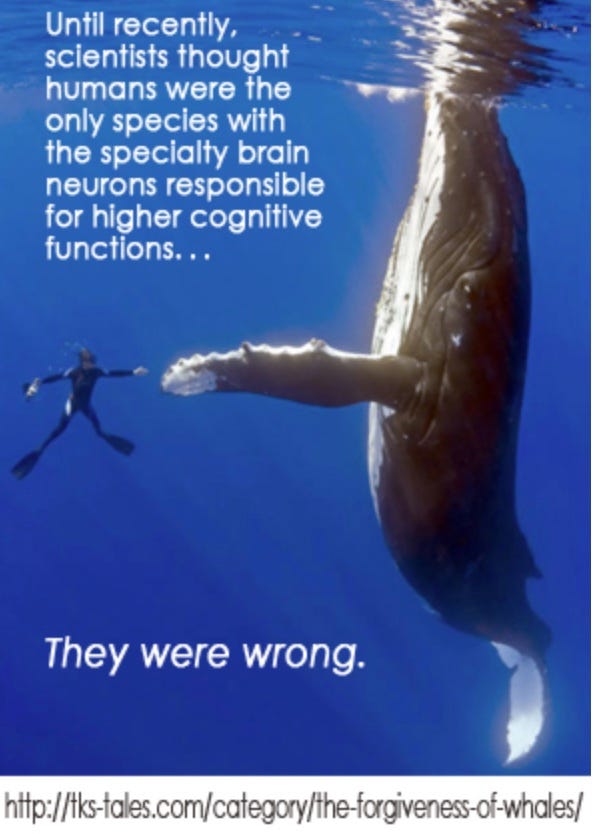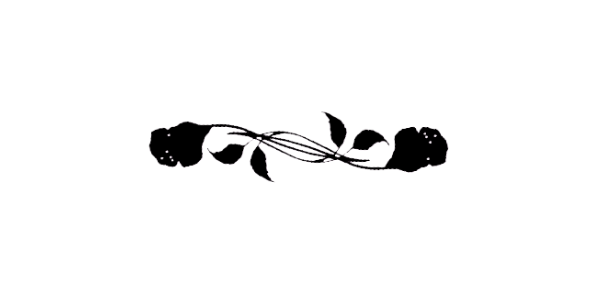Until recently, scientists thought humans were the only species with the specialty brain neurons responsible for higher cognitive functions like self-awareness, a sense of compassion, and language.
They were wrong.
Fifteen million years before humans, whales began evolving these special glial cells, and now a strange phenomenon is occurring off the Baja coast of Mexico.
Humans have been slaughtering Pacific whales there for a long time, first with harpoons, now with sonar from Navy ships. Whales live a long time, up to a hundred years. Some whales alive today still bear the scars of harpoons. Many scientists believe that it is implausible to think the whales do not remember this or associate humans with death and anguish.
Yet, in the same area where humans hunted them nearly to extinction, then tortured them with sonar, whales are approaching humans and initiating contact. A N.Y. Times article detailed the experiences of the reporter and the stories of locals who tell about mother whales approaching their boats, sometimes swimming under it and lifting it, then setting it gently down. Almost all the stories involve the whale surfacing, rolling onto its side to watch the humans–reminiscent of the surreal moment in the movie, Cast Away, when a whale rises from the night sea to regard Tom Hanks with an eye cupped with starlight, an eerie intelligence, and a gentleness that moves us, for we know the massive creature could kill the castaway with a nudge or a flick of a tail fluke.
These real grey whales off Baja swim close enough that people invariably reach out to touch them, and they allow it. One person, reflecting on the experience said, “I have never felt more beheld.” It seems reasonable—given the position the whales place themselves in—that they seek the contact. In many cases, a mother whale will allow her calf to do the same. There is no food involved in these exchanges, only a brief interlude of inter-species contact and rudimentary communication: I come as friend.
Why?
Where will humans be in another hundred years? I suspect we will be technologically advanced, but emotionally pretty much the same, even in a thousand years or ten thousand.
But what about a million years? Ten million? Can we evolve (if we survive) to a more sane, more rational, more loving species with a broader sense of our place in the universe and in life itself? Is it possible that these creatures with 15 million years of intelligent evolution on us, might regard us as a young species, children who don’t really know better, and grant us leeway for our mistakes? Grant us . . . forgiveness?
We have a need for that forgiveness, not only from our treatment of whales, but of each other. We have enslaved, tortured, raped, and slaughtered each other. We have recklessly used the resources of our planet.
Yet I read about humans risking their lives to free whales trapped in nets.
People offering aid to neighbors. . . to strangers.
Teachers, nurses, and soldiers whose daily life is one of giving.
We have much need for forgiveness, yes, but we are capable of great acts of cooperation, of kindness, love, and sacrifice. Perhaps that is what the whales see in us when they watch us use our clever hands to free them from heavy rope nets, nets that we have left carelessly in their domain, as children leave their toys strewn across the floor.
Even whales have enemies, and they do not hesitate to defend themselves when attacked and even take the battle to the enemy. Humpbacks have been observed defending not only their own against attacks of orcas, but other mammals, other whales, sea lions, fur seals or walruses. Interestingly, they only attack mammal-eating killer whales, not orcas that primarily feed on fish.
Perhaps they understand that—like the orcas—all humans are not the same.
Perhaps they are waiting for us to become our best selves, believing, or hoping we will evolve into worthy fellow creatures on this blue-and-cream jewel that is our world.
T.K. Thorne writes about what moves her, following a flight path of curiosity, reflection, and imagination.
Personal Note:
The basis of this piece was my first blog post several years ago. It has always haunted me, and I returned to it (with modifications) to share with you. Whales and dolphins have always fascinated me. One of my very early short stories involved a young autistic child and a dolphin who connected emotionally with her.
The special cells I mentioned, glial cells, may be responsible for imagination, creativity and probably play a role in consciousness. Einstein’s brain had an abundance of these cells, especially in the area responsible for spacial awareness and mathematics. Mice injected with human glial cells became 4x smarter. Glial cells can communicate with each other (via calcium waves) and with neurons, even signalling neurons to fire. Although whales don’t have all the “levels” of a human brain (and so their thought processes are probably distinctly different), whales have a much higher ratio of glial cells to neurons than humans in the neocortex, the area thought to be responsible for intelligence.
Hmmm.



This is such a beautiful article. Kudos to you and the whales.
Get Outlook for iOShttps://aka.ms/o0ukef ________________________________
Fabulous post. It will stay with me a long time. Hope you are well. Really something to think about. Happy New Year!
Sent from Yahoo Mail on Android
Thank you. Happy New Year to you and yours as well.
Thank you, Laura!
T.K., what a wonderful piece! I never feel more connected to the universe than I do in the autumn, so the timing for something like this could not have been better. It’s been many years since I thought that humans were superior, or even equal, to other species of life. Or that we had other species’ capacity for compassion or love. Thank you for again sharing your talent.
Lovely and deeply thoughtful as usual. I enjoyed this a lot. Thank you.
Thank you!